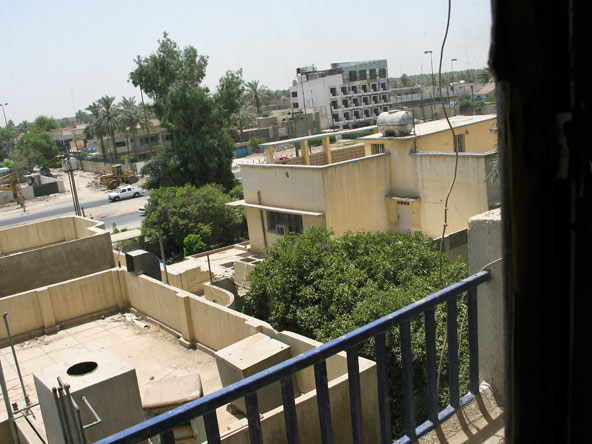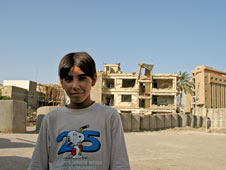
June, Baghdad, Iraq. The view from room 25 of the Hotel Dulaime in Karrada, where I wrote most of the stories for Salon. During the death-squad years in Iraq, it was extremely difficult to move around and interview civilians, who were often afraid to speak.
Photo: Phillip Robertson
I left the Sadr office and drove for five minutes down Al Shu'ala's dusty main street, and turned off onto a side road. Walking alone under the crucible sun in her black abaya was a woman of middle age hauling groceries. When I stopped the car to give her a ride, she climbed in, gave a blessing, and immediately pulled out the death certificate for her son and began to weep. We had just turned off the main road onto an abandoned Army base were half-constructed houses stood among piles of yellow bricks. This was Chikook, a squatters camp for Shiite families fleeing sectarian violence, managed by the Mahdi Army. Two police SUV's guarded the entrance and I was able to drive straight through without being stopped. The woman, who's name is Leila Hassan Hammadi, directed me to her house, a section of the army barracks and invited us to come inside to the cool dark of the house. A thousand dollars paid to someone she would not name bought her two rooms, joined by a hole punched in the concrete wall. Hammadi's three school age daughters quietly materialized from behind a partition to bring out orange drink and bruised apples. Hassan, who is desperately poor explained that her family had fled Taji where some of the worst sectarian attacks have been.
"My son was only a child and they threw him in the trash," Hammadi said, in a seizure of anguish. From a plastic bag where she kept her important papers, she took out postage stamp sized pictures of her eighteen year old son Ali and her husband and handed them to me. "They kidnapped my husband." When I asked who killed her son and taken her husband, she said she didn't know and was silent for a moment. "After they killed Ali, we received a letter at our house that said we had to leave in one week. It said if we see you a week from now, we will kill all of you. We didn't leave. That's when my husband was kidnapped." The date on Ali's death certificate was November 6, 2005. Hammadi and her daughters had been displaced for more than seven months. Without a man in the house, her only source of support was the Mahdi Army. Hassan's refusal to describe the attackers is completely normal in Iraq. As I left, Hammadi begged for my help, for any contacts with human rights group who can support widows. "I am in a special situation," she said. "Please."
A particular breed of captor will inflict pain on the captive because of his mere existence than on the basis of any real evidence. As for the likely execution that follows, the confession, extracted under torture, takes care of the reason for it. Noting this trend in violence here, writers on Iraq resurrected the dreaded term of art, death squad. Both sides in the sectarian conflict, if such a binary division is possible, have them. Iraq is now busy giving birth to secret courts that order the execution of prisoners, and the body dumping grounds they require. As to who is more brutal and less discriminating in their violence, it is Sunni extremist groups which include Al Qaeda by far; their members regularly target places where Shiite civilians gather (with an emphasis on markets and mosques), attacking with car bombs and suicide bombs to create daily scenes of massive carnage. What is perhaps worse, is that there are some ordinary Iraqis who support such attacks.
One thirty year old engineer from the Saydiyah neighborhood who I have known for more than a year, has become increasingly religious after a trip to Mecca, said in a confused phone conversation, "You know, Zarkawi was a good man because he protected Sunnis." Last year he had told me, "I hate the Shia. I hate them so much." When I asked what they had ever done to him he said, "Nothing." The young man's hatred is categorical, beyond reason.
Since the fall of Baghdad members of the Saddam's brutal security apparatus, the Mukhabarat, expanded their networks (the networks were never reallly destroyed) and forming alliances with the fundamentalist groups, who are in turn funded by people in other countries, such as Saudi Arabia. The result is a thoroughly efficient approach to creating a civil war, organized in large part by the same people who were the state killers under the old regime. Abu Musab al Zarkawi, the marketing genius behind the mass destruction of Shiites, is now a ghost who hovers patiently in the realm of the undead waiting for the day when the bloodletting becomes a flood tide. The old, secular, insurgency of former Iraqi army officers has now lost most of its influence to the religious fighters and their constant stream of funds from abroad.
On June 9th, a day after Zarkawi's death, Prime minister Nouri al Maliki's government instituted a sweeping Baghdad security plan which has not slowed the pace of bombings for much longer than a few days, a lull that might have been due to the mourning period for Zarqawi. Traffic moves at a perpetual crawl, and the simplest trips around Baghdad can take several hours. Meanwhile, new sections of the city in thrall to militia groups are becoming fundamentalist enclaves.
In Mansour, one of Baghdad's upscale neighborhoods, a flyer is circulating which says that any man caught wearing jeans would be killed. "We used to see things like that under Saddam," a nineteen year old rock and roll musician named Ahmed told me. "That's why I think it's the same people. If they caught a man wearing hair that was too long, they would beat him in the street. Those ideas of not wearing jeans and not wearing shorts, those are Saddam's sick ideas, and they just wanted to keep people freaked out." Ahmed explained that the advice in the flyer closely matched the threats the security services delivered under the old regime, that it had their style. In Mansour, it is now also a crime for a woman to go out with her hair uncovered, and she can be publicly beaten for it. By contrast, in Sadr city, where poor Shiites from the countryside are more conservative, such strictures are old news. In Mansour it is shocking development, but it also gives a clue about the nature of the insurgency and what the current alliances are. It is a natural metamorphosis for the former intelligence men, skilled in torture and abduction, to exchange the tyranny of Saddam regime for the blind absolutism of Al Qaeda, it merely requires a change of clothes.
This series was originally published in Salon.com, edited by Gary Kamiya.
 LEAD IMAGE: 6 June, 2006, Baghdad, Iraq. A young Shiite boy, Hassan, stands in front of the bombed complex at the Hamra hotel, in Karrada. Hassan's father shattered his leg when the roof collapsed and was no longer able to provide for his family. They now survive on what Hassan can earn doing odd jobs. A few months earlier, Al Qaeda in Iraq used two massive truck bombs to try to breach the perimeter of the hotel where foreign media was staying.
LEAD IMAGE: 6 June, 2006, Baghdad, Iraq. A young Shiite boy, Hassan, stands in front of the bombed complex at the Hamra hotel, in Karrada. Hassan's father shattered his leg when the roof collapsed and was no longer able to provide for his family. They now survive on what Hassan can earn doing odd jobs. A few months earlier, Al Qaeda in Iraq used two massive truck bombs to try to breach the perimeter of the hotel where foreign media was staying.Photo: Phillip Robertson
© Phillip Robertson, 2009-2014.
